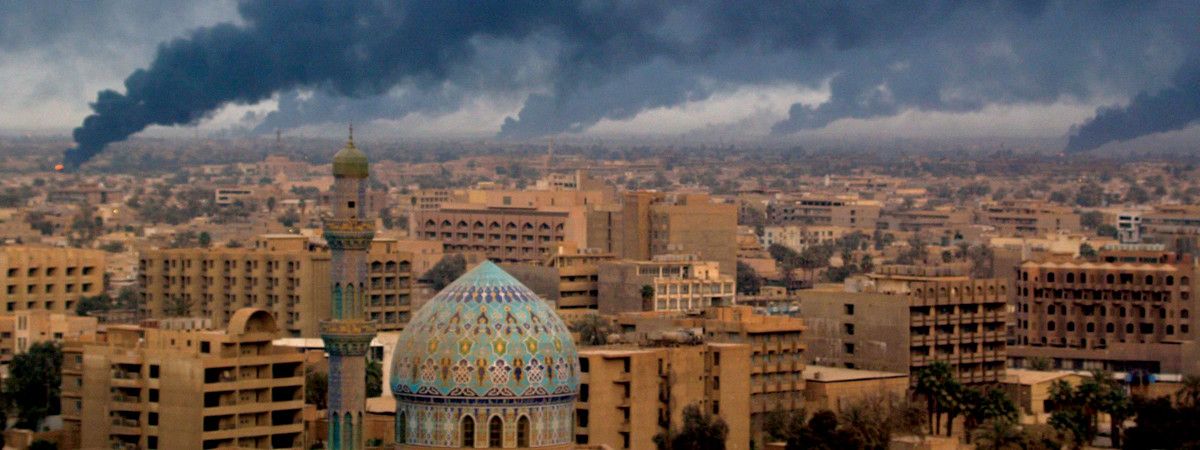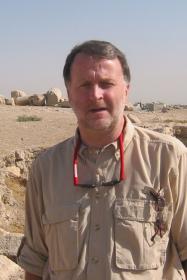I had been going to Baghdad for fifteen years before I had the fifteen-minute conversation that alerted me to the extraordinary power of the tribes of Iraq. At a private dinner in Jordan, in the aftermath of the US-led invasion, Arab friends urged me to research the role of the tribes. I trusted their judgement, so I did.
I have been to Iraq four times in just over a year – usually for eight to ten weeks at a time, and usually camping at the Palestine Hotel, on the eastern bank of the Tigris River, where this essay started coming together as I wrote my reports for The Sydney Morning Herald and The Age. Whatever angle of the Iraq story I was pursuing on a given day, I’d also have my fixers and translators guide me deeper into the exotic world of the tribes and the mosques.
For most of the last decade, it was the power of Saddam Hussein that transfixed reporters going to Iraq, and it was only when they were released from his iron grip that Iraqis could provide outsiders with an unvarnished portrait of forces that had been suppressed for decades. Iraqis call their men of power sheikhs. In the tribes, fathers hand to their sons power over the lives of their people; in the mosques, many of the sheikhs take their authority from a born-to-rule blood-line that goes all the way back to Mohammed. The more I saw of the sheikhs, and the more I talked with them, the more clearly I realised that the most fundamental power structures in Iraqi society run counter to those which underpin democracy.
When Westerners look at the Middle East, many mistakenly see a region of countries. But those national borders are a Western imposition; in reality, it’s a region of tribes and religions. It is essential to understand this if we are to hazard a guess at the outcome of the latest Western intervention in a part of the world that has stubbornly resisted democracy for all of its history.
I had hardly caught my breath at the military success of the US-led invasion when it began to emerge, rapidly and violently, that the occupation of Iraq could be a failure. What the US bills as “freedom” is seen by too many Iraqis as “occupation”. My Jordanian friends had said as much – if the Americans did not have the support of the tribes, they would fail. Equally, the occupation was unlikely to deliver Washington’s democratic beachhead in the Middle East unless it had the support of the Shiite spiritual leadership.
Before the war, the US failed to support the tribes’ attempts to overthrow Saddam. Iraqi history would have unfolded very differently had any of the coup attempts succeeded; instead, the US set itself on a collision course with the tribes. Today there is a vacuum where legitimate authority should be, and all of Iraq’s conflicts are expanding to fill it. Perhaps, then, this is a story of hubris. The US did not allow leading Iraqi voices a say in Iraq’s future. That, you’d have to say, is a peculiar way to bring democracy to a sceptical nation.
There’ll be arguments that it’s politically incorrect, racist even, to question the ability or desire of Arabs to embrace democracy. Nevertheless, if governments in the United States, Britain and Australia have staked their future on a presumption that the Middle East can be democratised, it’s necessary to grasp what they seem to have misunderstood. Instead of exploring political theory and comparative sociology, I have sought to allow Iraqi voices to reveal why today’s Iraq is not the nursery for democracy that Washington wants it to be.
CONTINUE READING
This is an extract from Paul McGeough's Quarterly Essay, Mission Impossible: The sheikhs, the U.S. and the future of Iraq. To read the full essay, subscribe or buy the book.
ALSO FROM QUARTERLY ESSAY












